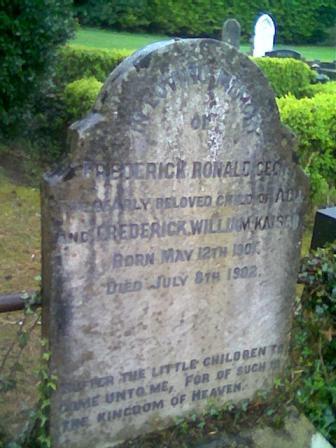Inscribed love
Driving towards Portlaoise, the phone rang. Pulling into the side of the road to answer, I realised I was at the ancient Clonenagh Cemetery. The temptation to climb the stile had to be resisted. Already this week, I have wasted an hour in a cemetery, wondering at the stories behind each of the stones
Some four years ago, at Tullybrannigan, outside Newcastle in Co Down, I found a stone that wove its own story.
Who were the Kaisers whose little boy, Frederick Ronald Cecil, died at the age of 14 months? Kaiser is hardly a typical Irish name: were they a family who were here briefly before moving elsewhere? Would that explain why the little boy’s memorial stands alone? Frederick William was the name of the German monarch, did the little boy’s grandparents deliberately name their son after a man who would have been heir to the German throne at the time of their son’s birth? Where did the Kaisers go afterwards? Did they move away? Or did they Anglicise their name and become King instead blending into the population around, in the way that the Battenbergs became Mountbatten? What was their line of business? They seem to have been comfortably middle class to have a white stone memorial for their infant son.

It is elegant, but also has an understated dignity about it. There is nothing brash or oversentimental, just a recording of the facts and a simple Bible verse. What intrigues me most is the recording of little Frederick Ronald Cecil’s parents’ names. This is the Edwardian era, just after the death of Victoria in 1901. This is in Ulster, possibly the most socially conservative corner of the United Kindom. Frederick Ronald is the dearly beloved child of “Ann and Frederick William”, in that order.
This is a profound statement. Young Frederick is called after his father, he is the fruition of the hope for a son, he is the one who will carry on the family name, his death would have stirred the most profound grief in the heart of Frederick William, but greater than that grief would have been the grief of the child’s mother. The inexpressible grief of Ann is conveyed in the subtlest and most gentle of ways, in a patriarchal age where women’s rights were minimal and where men always took pre-eminence, Ann is named as the first of the parents.
Even the stonemason would have queried this ordering of the inscription, Frederick William must have had to hold firmly to his conviction that the love of his wife for their son must be publicly acknowledged.
I think Frederick William Kaiser is a man for whom I would have had great respect. I hope he and Ann went on to enjoy happier days. I trust young Frederick Ronald Cecil grew in God’s grace, to be, in heaven, all that his parents had hoped him to be on earth.
Requiem æternam dona eis, Domine, et lux perpetua luceat eis

There’s nothing to add. What you say is exactly right.